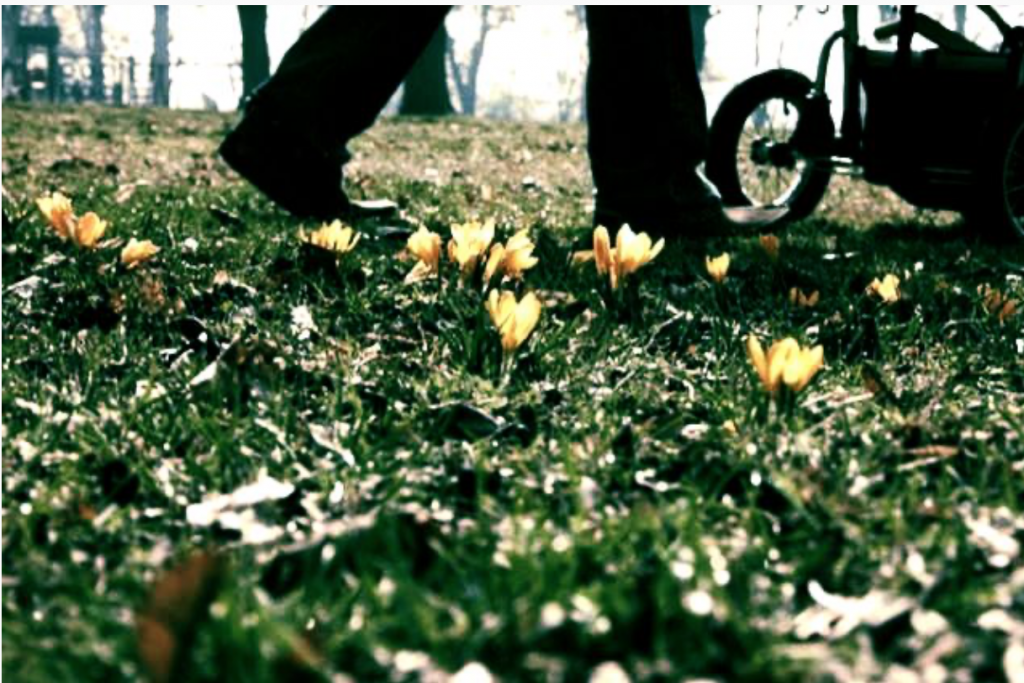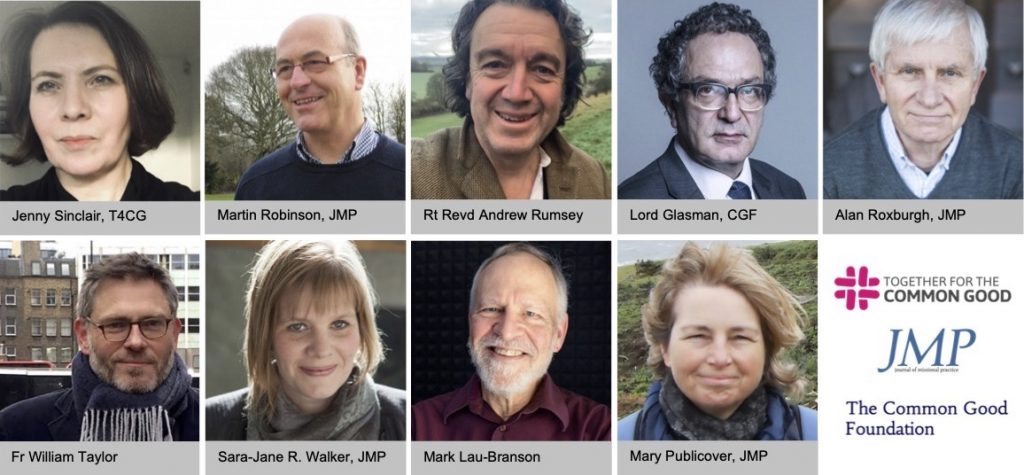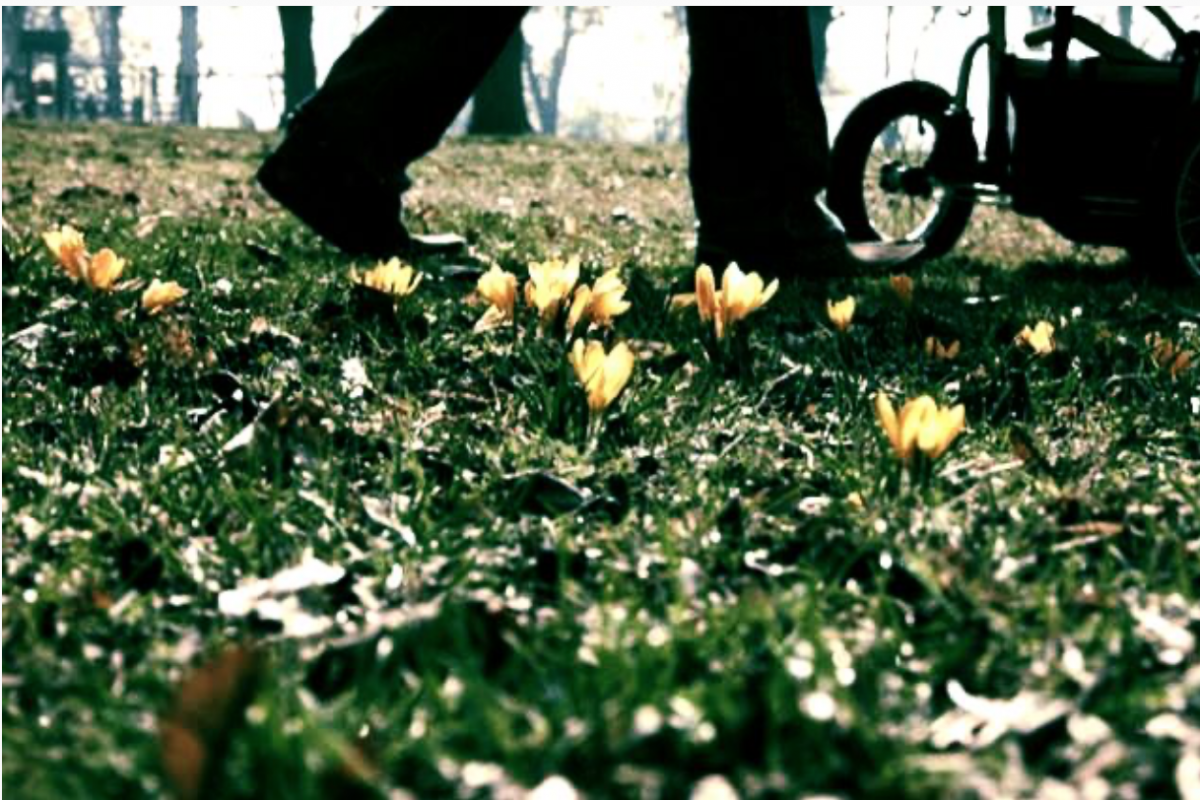
This is the third in a series of three open letters to the churches during the pandemic, written by a group of friends informally known as the Friday Group. This group was convened in early 2020 by Together for the Common Good and continues to meet weekly. This particular letter was written jointly by Jenny Sinclair (Founder and Director, T4CG); Alan Roxburgh, Martin Robinson, Sara Jane R. Walker, Mark Lau-Branson and Mary Publicover (Journal of Missional Practice); Lord Maurice Glasman (Common Good Foundation); Rt Revd Andrew Rumsey and Fr William Taylor. It was originally published on this website on 17 February 2021. You can download the three letters in a single pdf HERE
Click below to listen to the Friday Group reading the letter and talking about their work together
Overview
“Surely the Lord is in this place – and I did not know it”
Genesis 28:16
Over the last ten months we shared two ‘thought pieces’ with you, exploring themes that we feel are central to the challenges of our times and which speak to how churches could respond. The first was The Plague and the Parish: An Invitation to the Churches, and the second, Renewing the Covenant: Churches and the Building of Local Relationships. Now, we want to share with you a third piece, below this overview: The Politics of Grace and Place.
All three letters centre on the recognition that we are entering a new era, and focus on how we can make a transformational difference within our own particular context. We have especially highlighted the importance of the places we serve, the difference between ‘contract’ and ‘covenant’ and the revitalising of the Christian witness through practical expressions of God’s love. The fallout of the COVID 19 pandemic has accentuated the significance of these themes as we face the great task of civic renewal.
In our third letter, we want to share our sense that there is a political dimension to the local church’s vocation. Not in a party political or campaigning sense, but rather in its call to transform civil society. Though we aim to be servants, churches are more than service providers and – though we strive to be faithful witnesses – we are called to be more than evangelists. Our belief is that God is leading us to deepen our relationship with people, and with place. Our suggestions are not intended to be prescriptive or comprehensive, but aim instead to inspire actions arising from a gospel of grace, based on one who did not offer a manifesto for change, but was himself the Kingdom made manifest.
We offer The Politics of Grace and Place in fellowship and solidarity during this present wilderness. It is our hope that what follows will deepen the church’s reflection and discipleship.
THE POLITICS OF GRACE AND PLACE
A letter to the local church
Your ancient ruins shall be rebuilt,
You shall raise up the foundations of many generations,
You shall be called the Repairer of the Breach,
The Restorer of Streets to live in.
Isaiah 58:12
Dear Friends in Christ
These hard months have pulled back the curtain on the fragile nature of our condition. The need for a life-giving story that can renew us around the common good is increasingly obvious, making this a moment of truth for churches and communities alike.
In our conversation, the same questions keep surfacing: how should churches respond – and what is our role in the new landscape? Something deep seems to be missing in our civic discourse, which is calling our churches, even in their vulnerability, to action. In our earlier letters, we spoke of a change of era, in which ‘place’ (whether nation state or local community) is taking a more important role than in the period of globalisation. We have pressed for a recovery of ‘parish’ as a primary way of mending our frayed polity, and the urgent need to move from a society built around ‘contract’ to one of ‘covenant’. Covenant is a primary organisational principle for Christian community and a visionary basis for our political involvement, being nothing less than a call to participate in God’s re-making of the world. Having written about these things, we want to spell out further what they might mean for practical change.
The Sources of our Vision
There are many sources to this nourishing stream: The New Testament and Hebrew Bible, primarily – also Aristotle, Aquinas, and Catholic Social Thought. Alongside this, we have the witness and experience of countless Christian communities who, in the face of dehumanising powers, have upheld the image of God in every person. Pope Francis has returned to this theme – the relational power of love to resist domination – in his most recent Encyclical Fratelli Tutti.
The church is called to be the embodiment of love in a desecrated world: the Christian tradition, like the burning bush, is consumed with that passion without being extinguished. For all the endless churn and turmoil, despite our deep flaws and divisions, this remains the same. Therefore, we are filled with hope: that, here and now, the promise of love can be redeemed; that the sacred covenant between God and his people can be renewed – right where we are.
No political or economic power formed nature or human existence. Creation is not a commodity but a sacred inheritance, and we have a high calling. As social beings we are made for neighbourhood and while the past year has bound us together in new ways it has also revealed our isolation from each other. We have rediscovered common bonds but seen too the deep need for co-operation across different tribes. The re-weaving of our common life must, we believe, be grounded in local presence.
Relational Politics
This is not about party politics, but new forms of governance that restore dignity and agency to people in their concrete situation. It is about how we live together and negotiate our relationships in order to exert some control over the environment around us. We espouse, therefore, a politics of grace, based on God’s covenant with place and people. Only this can resist the domination of worldly power, global capital and the desecration of the earth.
It is a politics of relationship, to counter the politics of abandonment – in which the sharing of vulnerability can be turned into a mutual strength and where time spent together resists the divisions that separate. It is, in the fullest sense, a local politics that seeks to grow the ability of people to shape their life and realise the promise of their environment. It involves an alliance of institutions in order to shape a common good: drawing together those who may previously have been estranged or in conflict.
The Churches’ Vocation
Many churches have fallen out of relationship with the place and the people where they are situated. The call to relocate our common life is not nostalgia but stems from a desire to restore the church’s true vocation as a sign of God’s coming kingdom. This is slow but holy work, requiring patient attention to our immediate context and prioritising time spent with neighbours – more accidental and in situ conversations than meetings with agenda. It means sharing meals, walking together, meeting for coffee, hearing each other’s woes. It will grow awareness of others’ competencies and gifts and build trusting friendship across our beliefs, backgrounds and ethnicities, to the point where it is possible to speak freely as ourselves, rather than from our clerical or professionalised roles, and involve the whole people of God, ordained and non-ordained. In other words, it is a work of love that can form a bond that will be mutually strengthening and resilient enough to withstand events.
The gradual formation of trust with those we love and serve is transformed over time into an energy, an ability to act. It may begin as a series of conversations around a shared task, but from this, relational power flows. Building such local relationships, open to grace and new possibility is the basis of a new politics. Bound together in a mutual love for the place where we live, we become a people. This is so much more than ‘community engagement’: it is the process of becoming community – a people who formerly were not a people.
Becoming a Sustainable Community
If this common life is to be covenantal, it must be durable and its ownership must be local, represent neighbourhood interests and have a significant degree of autonomy. It must, therefore, also be institutional and sustainable. Dependence on grants can make institutions fragile and prone to being instrumentalised or compromised. Endowments, whether established by benefactors, investors, popular subscription or by the state, can help to insulate against this vulnerability. In practice, it may be that a church congregation comes together with a neighbouring club, or other local associations to form an organisation or alliance. When centred around an asset, a piece of land or a building, this will be more durable. There is something shared to protect, to be inherited by future generations.
A relational, place-based civic politics restores power and responsibility to communities. De-centralising the state must re-personalise society.
Covenantal Partnerships
What might this all look like? Embedded and embodied, it will be different in every situation.
It might look like the imaginative repurposing of church buildings or land; maybe the shared governance of local endowment funds or housing associations. In every case, it will be rooted in neighbourhood and intergenerational in character, with broad-based governance that upholds the dignity of work and our stewardship of nature.
Amid the demands and immediacy of the COVID crisis, it is all too easy for churches to be drawn into the role of service provider. Nevertheless, genuine covenantal partnership resists conscription to any agenda other than that which makes for peace and builds up our common life. State initiatives are characterised by short-termism and shallow roots: by contrast, the church is devoted to this place, echoing the promise of Christ: “I am with you always.”
In practice, the state may take on an enabling role and operate in a partnership capacity. But the autonomy of local institutions is vital, in order to balance power, uphold distinctive customs, skills and character and to provide contexts where people are able to grow a sense of belonging and local pride. From this stronger civic ecology relationships of reciprocity emerge, not only locally and regionally, but which can grow international solidarity and co-operation.
Grace-based common life
It is a distinctive contribution of Christianity that it held every person – whatever their culture – capable of grace and renewal in the image of God. This new covenant baptised many tongues into one body and so we stand for an inclusive politics that acknowledges the sins of empire and privilege, but seeks a kingdom that is deeper than racial or cultural difference.
The possibility of society based on grace and shared space is fundamental. This must be sensitive to dynamics of power yet essentially co-operative, incorporating varied voices into one story. ‘Parish’ denotes common ground – a fellowship of those who once were alienated, in which the dignity of every human person is upheld. Our analysis of oppression needs to cover both race and class, with a particular awareness of how economic power is manifested in each place. Land unifies us all, and our communities are interconnected as never before. A politics of grace calls us to explore new associations in which churches emerge as generous and honest brokers in building coalitions for the common good.
Times of crisis are invariably also moments of truth – and truth must liberate action. The churches’ heavenly vocation starts under our feet and, amidst the tragedy of this extraordinary season, a gestation is taking place that presents a unique opportunity to find again our place in society. It is time for God’s people to move beyond survival – or the anxious desire of returning to normal – and write our next chapter in pursuit of God’s kingdom.
This letter is one of the fruits of the ongoing conversation among our Friday Group which is framed by a generous and generative partnership between T4CG, JMP and CGF.

Like what you are reading? More inspirational content from Jenny Sinclair can be found here: https://togetherforthecommongood.co.uk/news-views/from-jenny-sinclair

